A charged metallic sphere A is suspended by a nylon thread. Another charged metallic sphere B held by an insulating handle is brought close to A such that the distance between their centres is 10 cm, as shown in Fig. 1.7(a). The resulting repulsion of A is noted (for example, by shining a beam of light and measuring the deflection of its shadow on a screen). Spheres A and B are touched by uncharged spheres C and D respectively, as shown in Fig. 1.7(b). C and D are then removed and B is brought closer to A to a distance of 5.0 cm between their centres, as shown in Fig. 1.7(c). What is the expected repulsion of A on the basis of Coulomb’s law? Spheres A and C and spheres B and D have identical sizes. Ignore the sizes of A and B in comparison to the separation between their centres.
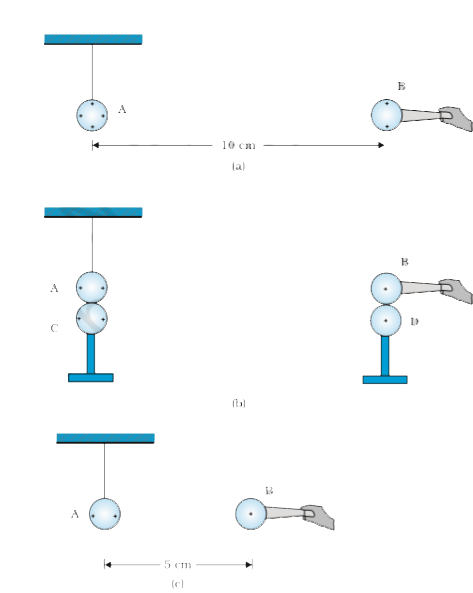
Let the original charge on sphere A be q and that on B be q′. At a distance r between their centres, the magnitude of the electrostatic force on each is given by
F=14πε0=qq'r2aa
neglecting the sizes of spheres A and B in comparison to r. When an identical but uncharged sphere C touches A, the charges redistribute on A and C and, by symmetry, each sphere carries a charge q/2. Similarly, after D touches B, the redistributed charge on each is q′/2. Now, if the separation between A and B is halved, the magnitude of the electrostatic force on each is
F=14πε0=(q/2)(q'/2)(r/22)=14πε0=F
Thus the electrostatic force on A, due to B, remains unaltered.
Topper's Solved these Questions
- BOOK - NCERTCHAPTER - ELECTRIC CHARGES AND FIELDSEXERCISE - EXERCISE34videos
ELECTRIC CHARGES AND FIELDS
- BOOK - NCERTCHAPTER - DUAL NATURE OF RADIATION AND MATTEREXERCISE - Exercise37videos
DUAL NATURE OF RADIATION AND MATTER
- BOOK - NCERTCHAPTER - ELECTROMAGNETIC INDUCTIONEXERCISE - Exercise17videos
ELECTROMAGNETIC INDUCTION
Similar Questions
A charged metallic sphere A is suspended by a nylon thread. Another charged metallic sphere B held by an insulating handle is brought close to A such that the distance between their centres is 10 cm, as shown in Fig. 1.7(a). The resulting repulsion of A is noted (for example, by shining a beam of light and measuring the deflection of its shadow on a screen). Spheres A and B are touched by uncharged spheres C and D respectively, as shown in Fig. 1.7(b). C and D are then removed and B is brought closer to A to a distance of 5.0 cm between their centres, as shown in Fig. 1.7(c). What is the expected repulsion of A on the basis of Coulomb’s law? Spheres A and C and spheres B and D have identical sizes. Ignore the sizes of A and B in comparison to the separation between their centres.
 View Solution
View SolutionA charged metallic sphere A having charge qA is brought in contact with an uncharged metallic sphere of same radius and then separated by a distance d. What is the electrostatic force between them
View Solution
Knowledge Check
- Question 1 - Select One
A metal sphere of radius r is charged to certain potential V. Then the charge on the metal sphere
AIs more if its is hollowBIs more if its is solidCWill have same charge irrespective of being hollow or solidDCannot be charged if it is hollow - Question 2 - Select One
For charged metallic sphere, potential changes with respect to distance from the centre as:
A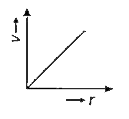 B
B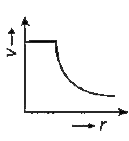 C
C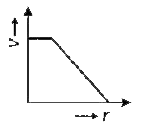 D
D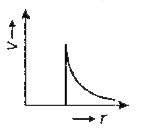
- Question 3 - Select One
A hollow metallic sphere is charged. Insider the sphere
Athe potential is zero but the electric field is finiteBthe electric field is zero but the potential is finiteCbothe electric field and potential are finiteDboth the electric field and potential are zero
An isolated solid metallic sphere is given +Q charge. The charge will be distributed on the sphere
View SolutionA metal sphere is suspended from a nylon thread. Initially, the metal sphere is uncharged. When a positively charged glass rod is brought close to the metal sphere, the sphere is drawn towards the rod. But if the sphere touches the rod, it suddenly flies away from the rod. Explain, why the sphere is first attracted then repelled?
View SolutionOne metallic sphere A is given positive charge whereas another identical metallic sphere B of exactly same mass as of A is given equal amount of negative charge. Then
View SolutionAn uncharged metal object M is insulated from its surroundings. A positively charged metal sphere S is then brought neat to M. Which diagram best illustrates the resultant distributions of charge on S and M
View SolutionAn uncharged metal object M is insulated from its surroundings. A positively charged metal sphere S is then brought neat to M. Which diagram best illustrates the resultant distributions of charge on S and M
View Solution
